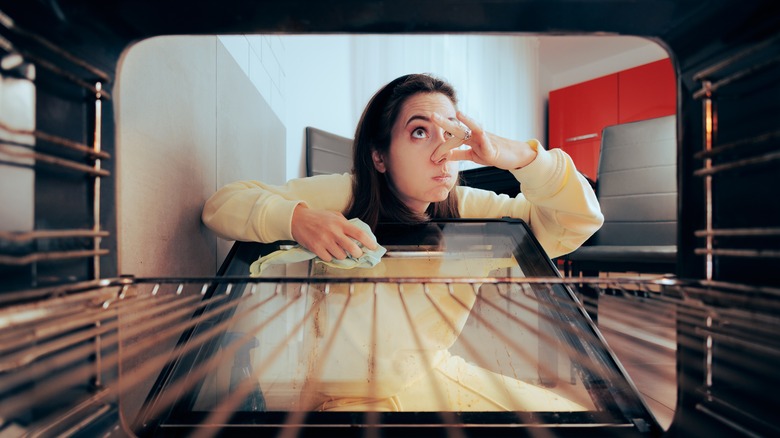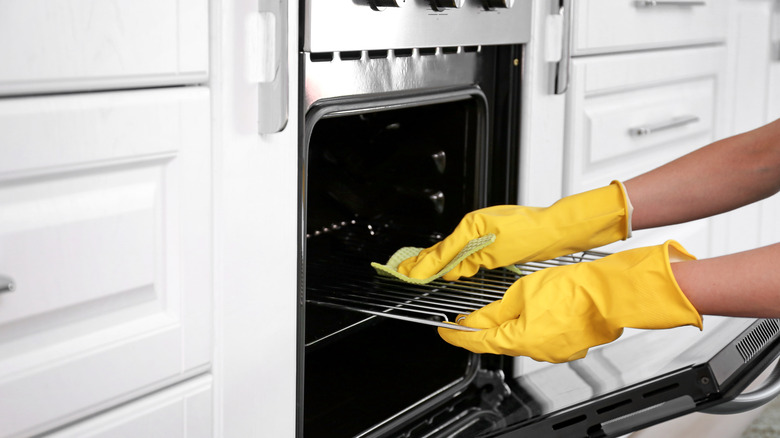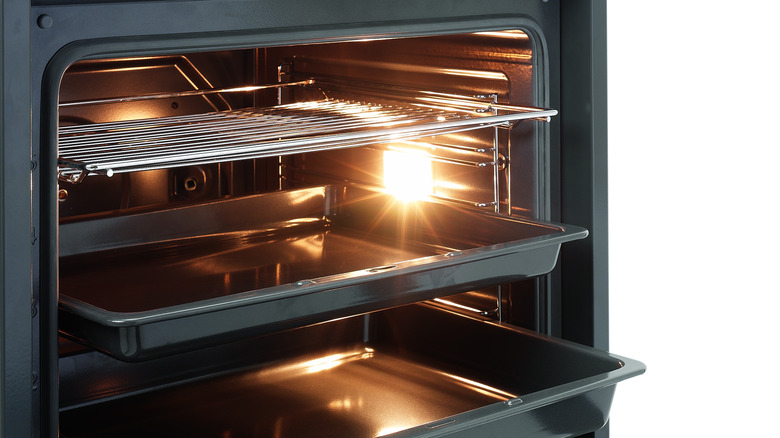How Often Should You Be Cleaning Your Oven?
In the regular kitchen clean-up, the oven is one thing that can get easily overlooked. When cooking, the noticeable things are cleaned first, like oil blotches on the stovetop, grease marks on the burners, and the general mess that is visible around the stove. As food sits on a stovetop after being spilled or burned, it becomes more difficult to clean (via The Spruce).
When we take food out of the oven, we usually close the door and forget about it for a bit, thinking we will clean it when it cools down. Cooks are advised to always wait to clean an oven until it's completely cooled off, per Bob Vila. But then life takes over, and we may not think about it again until we use the stove again. Since it's likely preheated, we tell ourselves we'll clean it once we finish cooking this next meal, and then the cycle continues.
When it comes to oven cleaning, out of sight may definitely be out of mind, and that's not a good thing in this circumstance. Routinely cleaning your oven is vital and should be part of your regular cleaning routine. Here's why.
Cleaning your oven on a regular schedule is vital
An oven works inefficiently if it's not cleaned, and you may start to notice issues in the meals you cook. Ron Shimek, the president of Mr. Appliance, told Martha Stewart, "Having excess residue built up in your oven will not only make your food taste unpleasant, but will also make your oven work harder to cook or bake your food to the ideal temperature."
This is a recipe for a food disaster. The oven will overwork itself and potentially open the door to other problems, including safety issues. As your meals may suddenly begin tasting off, your food may not cook thoroughly, which could cause food poisoning (via Healthline). A build-up of food remnants and caked-on debris may put a strain on the oven's capabilities, possibly resulting in a grease fire. It's also worth remembering that the oven could just stop working.
Clean your oven at least every three months
Another reason to clean your oven regularly is to prevent microbes from growing and contaminating your food surfaces. Melissa Maker, cleaning expert and influencer, told NBC News that stovetops should always be wiped down after cooking, and the front of oven doors should be cleaned at least once a week with an all-purpose or disinfectant cleaner to keep germs from multiplying.
When it comes to the full oven, you can do that more sporadically. According to Maker, who hosts "Clean My Space" on YouTube, "The inside of the oven should be cleaned every three months, or when you notice burnt-on food or smoke when you are baking."
This also need not be an exhausting job, because the newer stoves contain a cleaning feature. Maker pointed out to NBC News, "Most ovens are self-cleaning, just make sure you remove the racks and clean those separately and follow the manufacturer's directions for best cleaning practices." For those who don't have self-cleaning ovens, Home Depot suggests mixing up DIY cleaners including water, vinegar, and baking soda. The baking soda and water form a paste you can brush inside the oven. Spraying a vinegar and water solution foams the baking soda, and after sitting for 12 hours, the mixture can be wiped away with water on a clean cloth.


